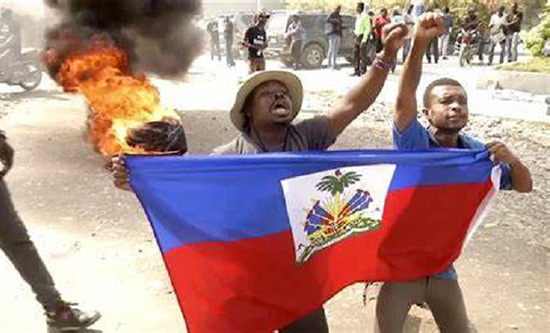
For two months hundreds of thousands of Haitians have taken to the streets to protest against poverty and foreign intervention on the island. Protests exploded in mid-September following acting President Ariel Henry’s announcement that subsidies on petrol, kerosene and diesel would be reduced in line with IMF demands. This took place in the context of widespread poverty, corruption and violence in the country caused by decades of US interference. Haitians responded to the cuts with mass protests and disturbances nationwide, including blocking the country’s main fuel terminal, Varroeux, in the capital Port-au-Prince. On 16 October the situation escalated as the US and Canada sent armoured vehicles and other military supplies to crush the mass anti-government demonstrations.
For over a century the US has meddled in Haitian internal affairs, using overt and covert force, and kept the country in a state of underdevelopment to guard US economic and political interests in Latin America and the Caribbean. There is systemic corruption inside the Haitian government, causing widespread poverty and instability. In 2004, in the aftermath of the second coup against the democratically elected Haitian President Jean-Bertrand Aristide, the ‘Core Group’ of six countries led by the US and UN was established to impose US imperialist control over Haiti.
Since its creation, the Core Group countries and organisations have played a hugely damaging role in overseeing growing inequality and volatility in Haiti. In 2009 the Haitian parliament tried to increase the minimum wage to $5 per day; however pressure from the US government, on behalf of major textile companies, prevented the bill from passing. David Lindwall, former US deputy chief of mission in Port-au-Prince, justified squashing the bill because it had the sole purpose of appeasing ‘the unemployed and underpaid masses’.
After the 2010 Haitian earthquake, which caused $8.5bn worth of damage, Core Group countries took advantage. Instead of providing support to the state to respond to the crisis, the imperialist nations and the UN sent in NGOs which took control of 80% of public services, solidifying Haiti’s dependence and underdevelopment. International donations for Haiti totalled over $10bn, but only a fraction of this made its way into Haiti as large amounts were spent on salaries, transportation and accommodation for the NGOs. Haitians organised protests under the slogan ‘UN, go home!’.
Current President Henry assumed office after the assassination of former president Jovenel Moise in 2021, in which Henry is widely suspected of being involved alongside US forces. Henry was part of a group, created by International Republican Institute (part of the US Republican Party) and by the US government’s National Endowment for Democracy, which was set up to overthrow the Aristide government in 2004. In 2021 after replacing Moise, the US-backed Henry called for Haitian ‘unity’ and promised presidential and legislative elections which he then indefinitely postponed. Under his rule, gang-related kidnappings and killings have accelerated, alongside a cholera outbreak and a food crisis that has resulted in 4.5 million Haitians, in a population of 11.5 million, experiencing acute food insecurity. On 11 September Henry announced the cuts to subsidies in line with IMF demands.
Hundreds of thousands of people poured onto the streets in protest demanding Henry’s resignation. Motorcycle and taxi drivers put up barricades of burning tyres on numerous highways (notably on the road to the airport in Delmas); as well as marches in a number of cities, forcing the country to a standstill. On 5 October Henry called for foreign intervention. This decree was backed by the UN, which implored the international community to deploy forces to stop the demonstrations. On 16 October the US and Canada ramped up hostilities by publishing a joint statement announcing that both countries had sent armoured vehicles and other supplies to Haiti’s capital. They asked other imperialist countries to join them in their intervention in Haiti.
The next day, while imperialist powers continued to call for armed action in Haiti hundreds of thousands of people across the country continued to demand the resignation of Henry, vehemently rejecting the government request for imperialist intervention, under the banner of ‘down with Ariel Henry, down with foreign occupation’. Demonstrations outside the US embassy, roadblocks and marches were organised.
Police repression is rife, as state forces fire tear gas and live ammunition at protesters. Over 50 people have been killed at the protests, the majority by brutal use of violence by police. Following the mass mobilisations, on 21 October the United Nations Security Council (UNSC) approved a ‘sanctions regime’, which involves an arms embargo on criminal gangs. The only named target in the UNSC resolution is Jimmy Cherizier, a former police officer and the spokesperson of the Revolutionary Forces of the Family and Alliance gang (RFG9), which was part of blockading Varroeux, the major fuel terminal in Haiti’s capital.
On 4 November, the Haitian National Police force seized back control of the Varroeux after an eight-week battle with protesters, using the armoured cars supplied by the US and Canada. However, blockades of other fuel terminals across the country are ongoing and thousands of people have continued to take to the streets to demand the end of foreign intervention in Haiti. Tensions have been bubbling right below the surface for years, with a constant stream of state attacks and protests in response. Security forces continue to violently respond to street resistance and growing numbers of journalists are being targeted. The imbedded instability, poverty and political corruption as a consequence of US imperialist intervention has opened space for widespread gang terror. Haitians must throw imperialism in all its forms – whether the Core Group, the UN, the NGOs – out of the country to have a chance at prosperity.
Destinie Sanchez
FIGHT RACISM! FIGHT IMPERIALISM! 291 December 2022/January 2023




